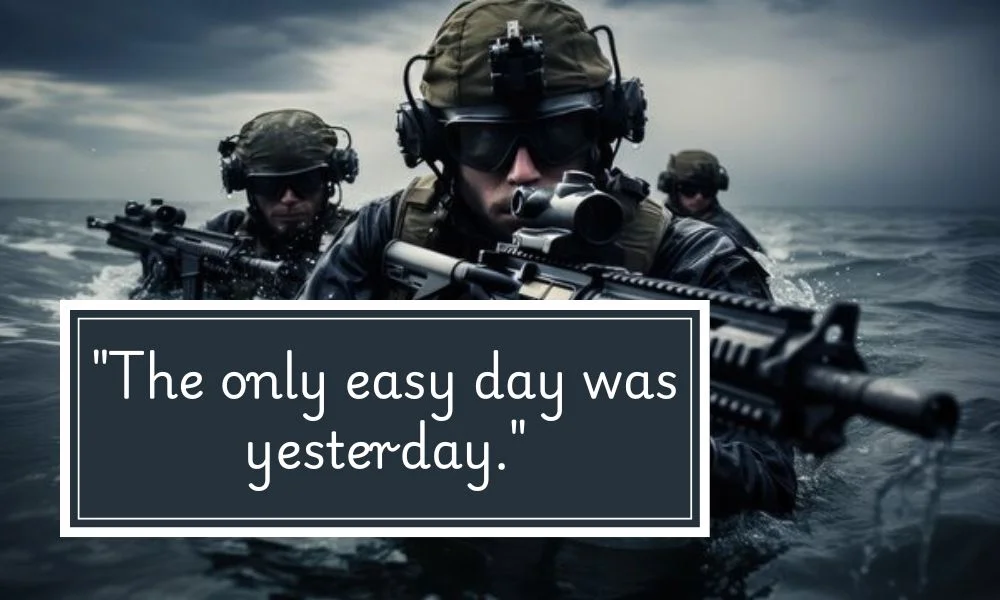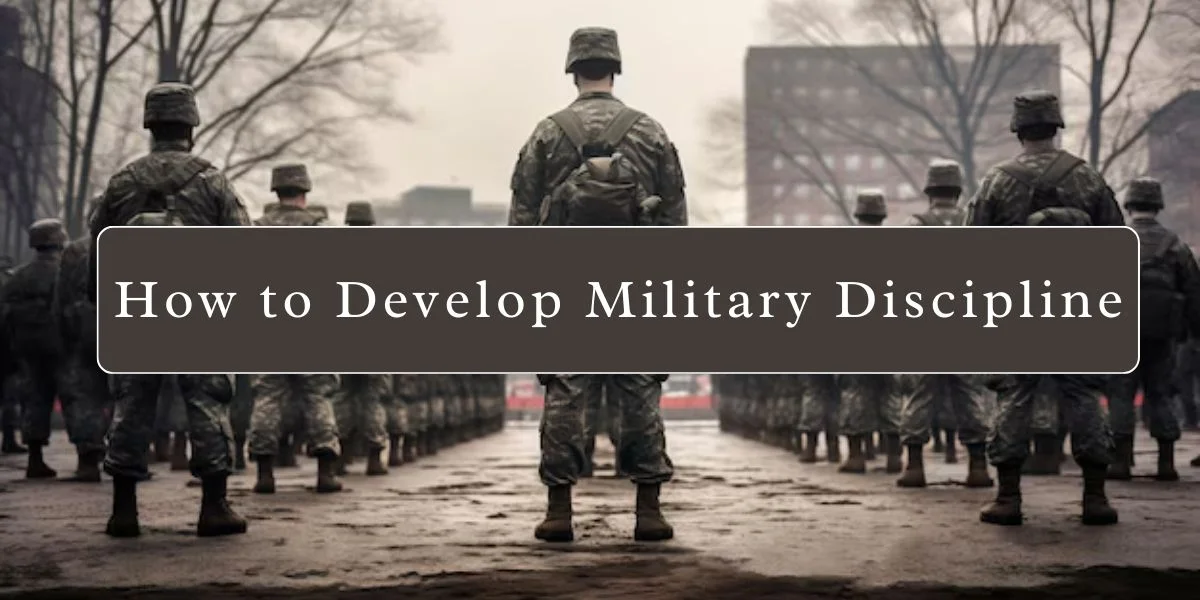Discipline is the key to success. If we take a group of people as an example of discipline, then military personnel will come first. That’s why we need a type of military discipline in our lives to achieve a goal.
How to Develop Military Discipline

This blog post will explore answers for how to develop military discipline with various strategies that will help one become successful in achieving goals. We will discuss actionable techniques, share inspiring quotes, and reference influential books to guide the development of military self-discipline for personal success.
What is Military Discipline?
Military discipline does not mean obedience. It’s about developing a mindset that prioritizes responsibility, accountability, and resilience. When military-style self-discipline comes into play, it means building those qualities within ourselves.
It means being in control of our emotions and actions to execute personal and professional goals at times when it is usually hard to do so. As Jocko Willink, a retired Navy SEAL, expressed, “Discipline equals freedom.” This simply means that the more military discipline you have, the more freedom you can achieve because you can focus on your goals in life without the potential for distractions or weaknesses getting in the way.
Key Principles of Military Self Discipline
- Discipline of Self: At the highest level, it involves control over our emotions and the ability to say no to temptation. Remove stimulating distractions from your environment.
For example, set a daily limit of 30 minutes for Facebook use and use a timer to maintain it. Log out after your allotted time to prevent mindless scrolling. - Punctuality: Try to arrive at least 15 minutes before you are needed. As the saying goes among soldiers, “If you’re not early, you’re late.”
- Love the Routine: Develop daily routines, such as morning exercises or evening meditation, which will create patterns for building self-discipline as well.
- Attention to Detail: Small tasks, such as making your bed, set a productive tone for starting the day and help to create the belief that small actions will add up to much larger successes.
- Forgiveness and Resilience: Allow yourself to make mistakes and learn from them. The military teaches you effectively that along the way, you are going to experience some failures. For example, when you make a mistake at work, acknowledge it, reflect on what went wrong instead of dwelling on it, and identify lessons learned. This mindset encourages personal growth and encourages a healthier approach to future challenges.
Strategies to Build Military Discipline
- Make Clear Goals
Know what you are trying to achieve in life, both in the short and long run. Put your goals down in writing and then divide them into small phases. As Stephen Covey says in The 7 Habits of Highly Effective People, “Begin with the end in mind.” - Develop a Regulated Lifestyle
Create a day-to-day routine that will be a combination of work, exercise, and rest. Make consistency in developing these habits of discipline. - Practice Mindfulness
Employ meditation or deep-breathing exercises that provide more insight into self-realization and emotional control. - Accountability
Having an accountability partner or mentor will go a long way in keeping you on your toes. As the military culture says, “Teamwork makes the dream work.” - Love Failure
Remember, failure is also a learning process. Assess your setbacks, make adjustments to your approach, and keep moving forward. As David Goggins says, “You are not going to outwork me.” - Physical Development
Regular physical exercise develops productivity. As General George S. Patton observed, “Fatigue makes cowards of us all.” - Growth Mindset
View challenges as opportunities to learn. These habits will build great self-images. According to Carol Dweck, abilities are not fixed patterns but rather developed through effort and hard work. - Reduce Decision Fallacy
Reduce decision fallacies by setting rules or habits so that fewer options are left to complete.
Real-life Examples from Movies and Books to Build Military Discipline
Military self-discipline is a powerful concept that can be developed through several strategies. There are real-life examples from movies and books that provide an in-depth understanding of how these strategies can become applicable. This article highlights essential strategies along with appropriate examples that define the process of military self-discipline.
Self-Control
Military discipline is the foundation of self-control. In the Johnny English movie, Johnny English, played by Rowan Atkinson, shows his ability to exercise self-control even in ridiculous situations. When faced with chaos, he keeps his focus on what is necessary to succeed in his missions. This illustrates that the military emphasizes emotional control and rational actions expected from individuals.
As one character states in the film, “A strong mind can separate the body from its suffering,” highlighting the importance of mental mastery in achieving discipline and success. In normal life, this type of self-control can help one remain calm in chaotic situations.
Timeliness
Military life requires punctuality. In Saving Private Ryan, soldiers strictly follow timelines during mission execution. Their success relies on synchronization and reaching specific points on time, which is important for missions.
Respecting Rituals
Rituals play an important role in military life. Sun Tzu, in his book The Art of War, champions rituals and discipline as essential ingredients for success before a war. Their structured training and preparation create a unified mindset among soldiers.
Such ideas suggest that goal-related rituals are instrumental in making individuals more disciplined in everyday life.
Attention to Detail
In Black Hawk Down, soldiers pay close attention to minute details during the mission, which is a key aspect of military discipline: everything they do—seam checks, equipment checks, and strategic planning—is done precisely.
This focus on minute details ensures safety and success in highly risky environments. It highlights the perspective that small actions can lead to major outcomes. You can also check your goals and daily task lists to remind your mind.
Forgiveness and Resilience
A theme in David Goggins’ memoir Can’t Hurt Me revolves around resilience. In his book, the author narrates his life experiences dealing with setbacks and failures. He emphasizes the importance of always moving forward from those setbacks. His story illustrates the principle of resilience in the military, where soldiers learn to forgive themselves and others to remain focused on their objectives.
Nurturing a Growth Mindset
This concept appears in a great way in the movie The Last Samurai, where Captain Nathan Algren, played by Tom Cruise, shifts from the negative grip of his past by adopting a growth mindset rooted in self-discipline and samurai values.
This shift enables him to grow personally and professionally, showing the potential of a growth mindset in developing self-discipline. That’s why we need to shift some issues to nurturing our mindset.
Decision Fatigue
Jocko Willink and Leif Babin provide great insight into clear decision-making processes in their book Extreme Ownership, highlighting the importance of decision-making in military operations. Great leaders simplify decisions to prevent decision fatigue and keep their teams focused and disciplined. They simplify choices and establish routines for better productivity, minimizing fatigue caused by overthinking.
We need to replace the phrase “decision fatigue” or “fallacy” with “decision making.” By the way, decision-making is a great soft skill, especially for high-profile job requirements.
Autosuggestion
One effective tool for discipline is autosuggestion. In the movie The Pursuit of Happyness, Chris Gardner, played by Will Smith, applies positive affirmations and visualization to navigate life’s challenges. We can apply autosuggestion to stay motivated in achieving our fixed goals and daily tasks.
Inspirational Quotes to Motivate You

- “The only easy day was yesterday.” – Navy SEAL motto
- “Discipline is the bridge between goals and accomplishment.” – Jim Rohn
- “Success is no accident. It is hard work, perseverance, learning, studying, sacrifice, and most of all, love of what you are doing or learning to do.” – Pelé
- “What lies in our power to do, lies in our power not to do.” – Aristotle
- “Success is the sum of small efforts, repeated day in and day out.” – Robert Collier
- “You must expect great things of yourself before you can do them.” – Michael Jord
Recommend Military Discipline Books
There is a book list of book, that can help you to develop the military discipline.
- Extreme Ownership: How U.S. Navy SEALs Lead and Win by Jocko Willink and Leif Babin
- Can’t Hurt Me: Master Your Mind and Defy the Odds by David Goggins
- The 7 Habits of Highly Effective People by Stephen Covey
- Mindset: The New Psychology of Success by Carol S. Dweck
- The Power of Habit: Why We Do What We Do in Life and Business by Charles Duhigg
Developing military self-discipline is a journey, not a destination that requires commitment and effort. By following the strategies in this blog you can develop the self-discipline to achieve your goals and live a fulfilling life. Although the comparison between normal and veterans becomes theoretical but remember discipline is not a destination but a journey of growth and improvement. As you start this journey remember the words of General Colin Powell “There are no secrets to success. It is the result of preparation, hard work and learning from failure”.
Apply these principles of military self discipline and you will observe a great change in your life. Practicing military discipline teaches you to prioritize commitments, manage time, and focus through distractions. It allows you to push through challenges and obstacles and reinforces the idea that perseverance is key to success. Each small win builds on the last and creates a foundation for future wins. Moreover adopting a military disciplined mindset fosters resilience. It teaches you to see failures as opportunities to learn not obstacles. By installing military self-discipline in your daily life you will increase your effectiveness and set yourself up for long-term success.

